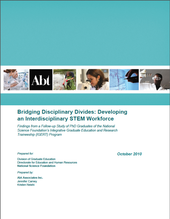Library Item
Bridging Disciplinary Divides: Developing an Interdisciplinary STEM Workforce
Description:
This report summarizes a recent study of the IGERT program conducted by Abt Associates Inc. The study examined degree completion and short-term professional outcomes of IGERT graduates and compared the outcomes with those of other STEM doctoral students. The study found that:
- IGERT addresses national calls for greater emphasis on interdisciplinary training in graduate education. High proportions of both IGERT and non-IGERT graduates report that they were interested in interdisciplinary education when applying to graduate school. However, IGERT students receive more interdisciplinary training and are significantly more likely to complete interdisciplinary dissertation research, 75 percent of IGERT graduates report that they drew on at least two disciplines in their dissertation research, compared with 61 percent of non-IGERT graduates.
- IGERT helps students obtain advanced degrees in less time. Students who receive IGERT traineeships are required to participate in IGERT-specific activities—such as courses, laboratory rotations, research projects, or internships—in addition to the activities required by their home departments. Despite these additional requirements, IGERT graduates complete their doctoral degrees nearly half a year sooner than their non-IGERT counterparts.
- IGERT prepares students well for today’s STEM workforce. IGERT graduates report feeling equally or better prepared than their non-IGERT peers for research positions in government, industry, and academia. Both groups were equally successful obtaining jobs in a variety of employment sectors, but IGERT graduates report that the preparation received through IGERT gave them a competitive edge in the job market. They also report experiencing less difficulty landing their first jobs than their non-IGERT peers.
- IGERT graduates surpass non-IGERT graduates at integrating multiple disciplines. Both IGERT and non- IGERT graduates draw on multiple disciplines in their current positions. However, IGERT graduates are more likely to report that their IGERT training prepared them for interdisciplinary work, and are significantly more likely than their non-IGERT peers to work on research projects or teach courses that require the integration of two or more disciplines.
- IGERT training is valued by IGERT graduates. Most IGERT graduates place high value on their IGERT experience. They credit IGERT with helping them complete their degree, secure employment, and prepare for the demands of the scientific workforce. Graduates cite two specific factors as particularly helpful in obtaining professional positions: the program’s interdisciplinary research training and professional networking opportunities. One finding is perhaps the most revealing about whether IGERT training is valued by its graduates: 94 percent stated that they would recommend their IGERT graduate program to prospective students pursuing similar career paths.






